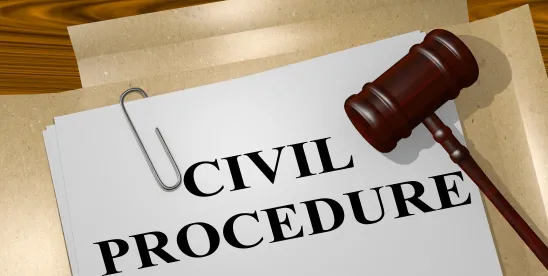Effective April 1, 2015, the Commercial Division of the New York State Supreme Court promulgated a series of reforms to the Rules of Practice for the Commercial Division, including the addition of new Rule 11-e, which provides specific requirements for responding and objecting to document requests.
In particular, Rule 11-e(a)-(b) requires parties to provide particularized responses and specify in detail whether documents are being withheld in response to all or part of the requests, and Rule 11-e(c) requires a date for the completion of document production prior to depositions. These are markedly different than those required by the Uniform Civil Rules that govern non-Commercial New York State Supreme Courts and County Courts, and have been the subject of much discussion by courts and practitioners in the ensuing years. However, one significant requirement of Rule 11-e that is often overlooked concerns Rule 11-e(d).
In particular, Rule 11-e(d) provides as follows:
(d) [b]y agreement of the parties to a date no later than one (1) month prior to the close of fact discovery, or at such time set by the Court, the responding party shall state, for each individual request: (i) whether the production of documents in its possession, custody or control and that are responsive to the individual request, as propounded or modified, is complete; or (ii) that there are no documents in its possession, custody or control that are responsive to the individual request as propounded or modified.
In other words, in addition to responding and objecting to document requests at the outset with specificity as required by Rule 11-e(a)-(b), one month prior to the close of fact discovery or another date set by a court, parties are further required to issue a statement that specifically denotes for each request whether document production is complete as requested or modified, or that they are not in possession of responsive documents. Such a formal obligation at the conclusion of discovery to specify whether production is complete for each individual request is not found in the Uniform Civil Rules or the Federal Rules of Civil Procedure, and appears to be entirely unique.
Despite this, Rule 11-e(d) seems to have largely gone unaddressed in the last decade with most courts and practitioners focusing instead on the other significant requirements of Rule 11-e. Even so, as recently as 2023, in Men of Steel Enterprises, LLC v. Bespoke Harlem W., LLC, 2023 N.Y. Slip Op. 30404[U] (Sup. Ct. N.Y. Co. 2023), the Honorable Joel M. Cohen ordered plaintiffs to submit amended responses to comply with the requirements of Rule 11-e(d) and did so despite the fact that plaintiffs had already represented in their opposition that they had produced all responsive documents and did not have additional documents in their possession, custody, and control—demonstrating that the Rule is alive and well and may be enforced to the full extent, even if merely as a formality. While it remains unclear how focused courts will be on the requirements of Rule 11-e(d) statements going forward, including their form and use, those practicing in the Commercial Division should be prepared to comply with its requirements.




 />i
/>i
